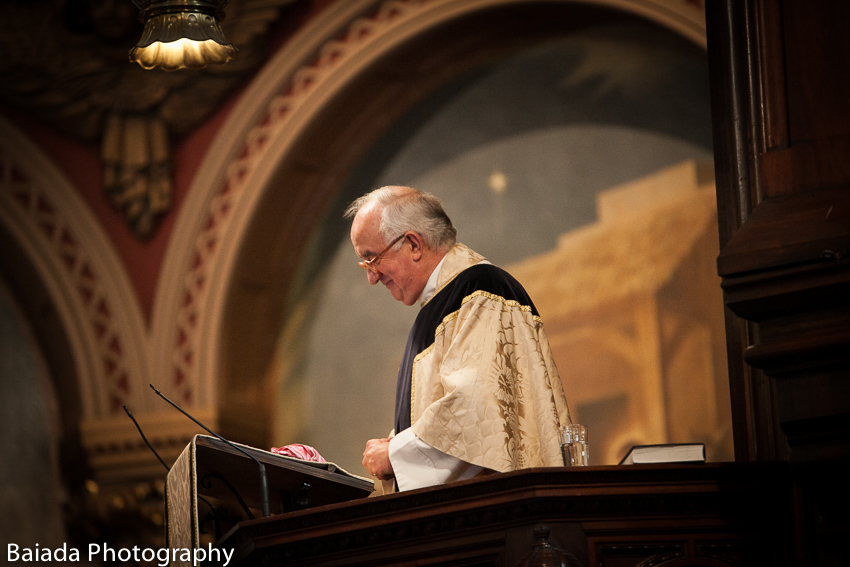Sermon Text
Sermon preached at Trinity Church, Newport, Sunday October 25th 2015
The Reverend Alan Neale, “Is there really loose change?”
Mark 10:51 “Jesus asked, ‘What do you want me to do for you?”. There are seven profound questions that Jesus asks in the records of New Testament history.
All of them redundant, in a sense for Jesus knew what was in the hearts of those to whom he ministered, spoke and met. Today’s text must have caused the disciples to nudge each other, onlookers to wink and opponents smirk.
Imagine, before Jesus stands a man blind from birth, beggar by trade and belittled even by the disciples.
Excuse me, Jesus, this does not seem a difficult diagnosis; the requirement for lab tests is really are unnecessary. THE MAN IS BLIND, BEREFT, BELITTLED.
Yet in all Synoptic Gospels the story is repeated; a telling us THIS IS REALLY, REALLY, REALLY IMPORTANT. GET IT?
But did Bartimaeus want to change?
This week I saw a cartoon that was in two parts.
Upper part, minister asks congregation, “Who wants change?”. Hands soar into the air, upright and confident; faces look heavenward. Minister ecstatic.
Lower part, same minister asks same congregation not “who wants change” but “who wants to change?”. Er… now arms are tied to the pews, eyes glued to floor. Minister downcast.
 Bartimaeus had to deal with same challenge. Ready to change identity, to change his livelihood, to change status from victim to responsible adult?
Bartimaeus had to deal with same challenge. Ready to change identity, to change his livelihood, to change status from victim to responsible adult?
At a small community’s town meeting, a young man (frustrated with the reluctance to grow) challenged the people “Do you want to change or… do you want to die?”. The life-hardened man next to him muttered, “If I were you, I wouldn’t give them that choice”.
In life we are called to accede to the demands of change. As years gently roll by, pick up pace and then race ahead. In today’s Gospel, the disciples had good mission plans, Bart challenged them to change… Accept change or be condemned to frustration, resentment, bitterness and anger.
In relationships we are called to accede to the demands of change. Whatever model we use, our closest relationships are generally in terms of parent/child, care-giver/care-taker, decision-maker/consensus builder. All good as long as no-one feels abused but the moment comes when, say, the “parent” wants to become the “child” (i.e. wants to change) but does not discuss this leaving a “child/child” dynamic. Ouch… um, not good. Accept change or be condemned to frustration, resentment, bitterness and anger.
In faith we change or we collapse, we develop or we decompose. Many images you had of God when young will not operate in adulthood. In church, we change (?) from observer to participant. With Jesus we change from dutiful onlooker to passionate disciple. Expecting church to give to us is changed/transformed into giving to the community of faith. More religious language becomes sign rather than symbol, the paradigms begin to expand rather than harden. The ancient struggle around change in the Roman Catholic Church continues; this is a struggle that has caused leaders to fall and collapse, even Popes and sometimes physically. Accept change or be condemned ourselves to frustration, resentment, bitterness and anger.
But all this talk of change is exhausting, yes? At this point the Lord affords, offers, presents to us the experience of his constancy, permanence, stability. “God is our refuge and strength, a very present help in time of trouble” Psalm 45:1. “You remain the same, your years will never end” Psalm 102:27. And Hebrews 13:8 “Jesus Christ is the same yesterday, today and forever”. “Give thanks to the LORD, for he is good; for his steadfast love endures forever” I Chronicles 16:34.
This constant, immoveable love is the bedrock that gives us stability; the beating heart that gives us life in all life changes.
Bartimaeus received little notice, little respect, little attention… but did he want to change? “What do you want me to do for you?”. When time Jesus asks this question, our friend Bart has shed his cloak (the badge of his identity), has raced ahead (lying aside his disability) but… even in all this new-found life and success, the question must be asked, “What do you want me to do for you?”. Enthusiasms are good but not sufficient.
Often in pastoral conversations I ask the same question “What do you want Jesus to do for you?”. It is always a moment of existential clarity.
It has sometimes been said of the church “Like a mighty tortoise moves the church of God, brothers we are treading, where we’ve always trod”; let that not be said of us as church, as Christian, as a human being.
The time will come my friends when the process of change draws to a close; our fatigue and exhaustion will end; as Paul writes in 1 Corinthians 15:51 “Behold we shall not all sleep, but we will all be changed… in a moment, in the twinkling of an eye… at the last trumpet”.
Maybe heaven is experience of radical, joyous, ennobling changelessness?
Lord, I give myself to you; change me with skillful, patient, loving hands. AMEN

